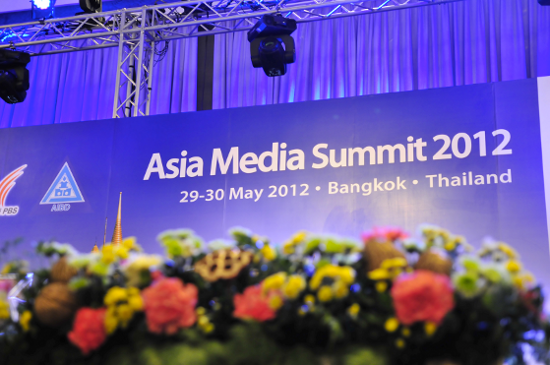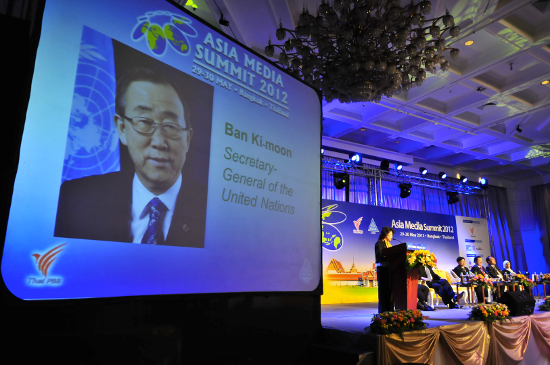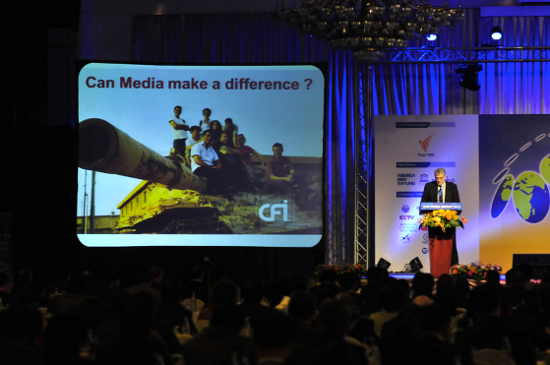Broadcasters and other media stakeholders in Asia Pacific presented additional recommendations for the proposed Bangkok Declaration 2003 +10 that will serve as a guide in strengthening their responses to the changing media landscape and emerging global realities.
Broadcasters and other media stakeholders in Asia Pacific presented additional recommendations for the proposed Bangkok Declaration 2003 +10 that will serve as a guide in strengthening their responses to the changing media landscape and emerging global realities.

The Bangkok Declaration 2003 + 10 is a revised document sourced from the original Bangkok Declaration 2003 which was approved at the 1st Conference of Ministers of Broadcasting on Information and Broadcasting in Bangkok in May.
The original document contained five themes, which was later revised to include five more additional subjects. The themes with corresponding recommendations are cultural diversity, globalization, digital divide, public service broadcasting human resource development, media accountability, social media, media and environment, media in countries of conflict and transition states, and women empowerment.
At the parallel session on ‘The Bangkok Declaration 2003: What’s Next,’ participants identified other recommendations to be incorporated into the Bangkok Declaration 2003 + 10.
These recommendations call on broadcasters to
Introduce and implement code of conduct to ensure moral and ethical contents, especially when using social media;
Adopt light-handed rules or practices, which encourage to protect copyright, provide protection for consumers, and invest in innovative and creative products and services in traditional media, especially social media.
Protect mother languages across the globe;
Ensure that all of the world’s population has access to television and radio services as well as to ICTs,
Encourage the development of content and put in place technical conditions in order to facilitate the presence and use of all world languages on the Internet;
To send a strong message that discourages the use of media to misinform and sow hatred, particularly in countries of conflict and in transition states;
Provide regular training for staff in PSB to understand new technology and how it works, to produce content that is attractive and beneficial to the people
Ensure media and information literacy programs are propagated in all media
Encourage broadcasters to interact with audiences, for instance, with activists of climate change, who have become active users of new media.
After the Asia Media Summit, AIBD will revise the proposed Bangkok Declaration 2003 + 10, which will then be presented before AIBD General Conference for their final approval in Nepal in July.
More Recommendations for the Bangkok Declaration 2003 +10
Broadcasters and other media stakeholders in Asia Pacific presented additional recommendations for the proposed Bangkok Declaration 2003 +10 that will serve as a guide in strengthening their responses to the changing media landscape and emerging global realities.
Making a Difference in Development
Mr. Ban Ki-moon, Secretary General of the United Nations, urges broadcasters in Asia-Pacific to tell sustainable development stories in the region, including successes and setbacks that can “ serve as a model for the way forward and in offering solutions for tomorrow.”
Nurturing PSB Values
Building authority, honesty, trust, credibility, and a sense of mission are some of the values public service broadcasters need to sustain their existence and growth in the fast changing media landscape.
AMS 2012: Session 5 – Harnessing Social Media and Content Delivery
Day 2 - Tuesday, 30th May, 1100 - 1230
Session 5: Harnessing Social Media and Content Delivery
Facebook, YouTube, and blogs, among others, have empowered more citizens to create, produce and distribute content to a wider audience. Users are increasingly conversing and engaging as a consumer, creator and producer of information. What can traditional broadcasters learn from their online counterpart? How should broadcasters prioritize acquisition and operations of web-based and mobile technologies and turn them into effective platforms for interactive dialogue? How can mobile, web, iPad and social media improve media’s sustainability in the context of development?
Users Instructions in News and Commentary
Mr. Ricardo Saludo, Managing Director, Center for Strategy, Enterprise & Intelligence, Philippine recommends the posting of user instructions as one media literacy measure to educate the public about the press right at the point of watching, hearing and reading news and opinion.
Making a Difference in Settling Conflicts
Media should play a more active role in helping prevent and settle conflicts, for instance, in serving as a third party to analyze the interest of both parties, which might lead to reconciliation and resolution.
AMS 2012: Session 4 – Public Service Broadcasting: A New Approach, A New Beginning
Day 2 - Tuesday, 30th May, 0900 - 1030
Session 4: Public Service Broadcasting: A New Approach, A New Beginning
What should the mandate of public service broadcasting (PSB) be in a fast changing media landscape? In Asia-Pacific, PSB remains at various stages of development, increasingly confronted by financial stability, editorial independence, and issues of autonomy in content creation, management, finance and administration. Is it still a viable alternative to serve the public’s needs and interests? What can management pursue to expand and sustain viewership, introduce new business models and ensure more independence in its operations?
AMS 2012: Session 6 – Towards A Stronger Public Trust in Media
Day 2 - Tuesday, 30th May, 1600 - 1730
Session 6: Towards A Stronger Public Trust in Media
Through good journalism, distinctive and entertaining content, and professional management, media aims to build and sustain public trust, a key element in empowering media better serve the ends of development and promote business sustainability. In Asia-Pacific, is public trust in media increasing or waning? How can media enhance its credibility and integrity? Will more regulation, deregulation or self-regulation work to enhance public trust in media? Are social media platforms enhancing public trust in traditional media?
AMS 2012: Parallel Session 3 – Women and Children Issues: Is Media Doing Enough?
Day 1 - Tuesday, 29th May, 1600 - 1730
Parallel Session 3: Women and Children Issues: Is Media Doing Enough?
Violence, abuse, inequality and discrimination against millions of women and children across the globe remain a hindrance to efforts to make their life a little better. The damage to these victims is staggering, its impact a menace to development and society. Is media doing enough to address the deadly crime of violence and abuse against women and children? Is it reporting enough to deal with inequality and discrimination as well as the advancement of women in today’s society? Can social media and citizen journalism help?
AMS 2012: Parallel Session 2 – Building Sustainable ‘Small’ Radio and TV Stations
Day 1 - Tuesday, 29th May, 1600 - 1730
Parallel Session 2: Building Sustainable ‘Small’ Radio and TV Stations
‘Small’ radio and TV stations are increasingly playing a pivotal role in informing and educating the public in many developing countries in Asia-Pacific. Given limited resources and competition, they seek ways to build and sustain their operations. Is there one-size-fits all strategy to achieve this goal? What business models and programming strategies can they pursue? Will tapping mobile and the web make a difference?




